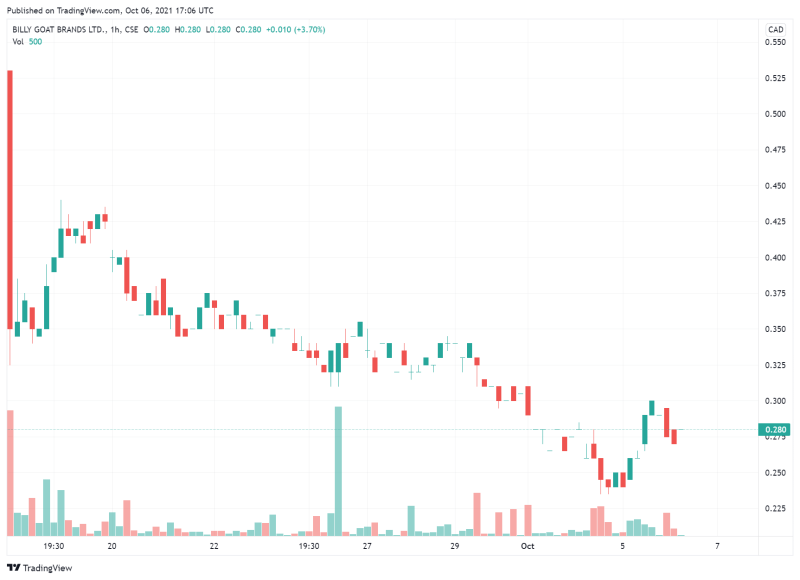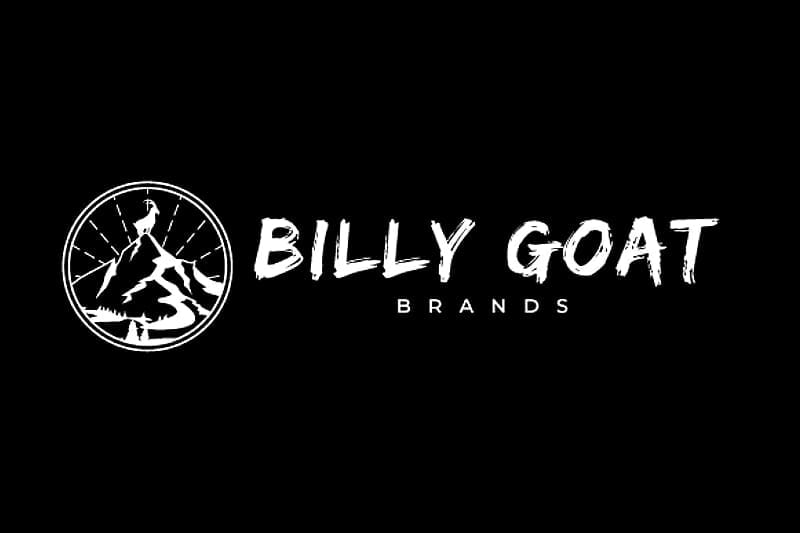Billy Goat Brands (GOAT.C) announced today that it has signed a letter of intent (LOI) with Cascadia Seaweed Corp. (Cascadia) to purchase an equity stake in the private business. The capital is intended to be used by Cascadia to accelerate its ethical seaweed cultivation plan, increase production capacity, and propel marketing efforts.
“We are excited to enter into this LOI and look forward to completing the investment. The GOAT team feels it is important to support Cascadia Seaweed’s development as it paves the way for economic sustainability in coastal communities while protecting the health of our oceans. Seaweed is known to provide tremendous benefits for the marine ecosystem and Cascadia Seaweed is well-positioned to contribute to the long-term viability of the blue economy as well as the sustainability of the environment surrounding its operations,” said Tony Harris, CEO of Billy Goat Brands.
It’s no secret that I am a fiend for seaweed. Ever since I first tried seaweed back in junior school, I have been addicted to its subtle crunch, paired with an intense saltiness. Characterized by its distinct umami flavor, seaweed has secured a place in my heart and in my stomach. Let’s not forget that seaweed is low in calories, packed with nutrients, and contains several antioxidants. More specifically, seaweed contains iodine and tyrosine, two chemical elements that are naturally found in some foods. That being said, the thyroid gland, which is responsible for making hormones that help control many vital functions, relies on iodine and tyrosine to function properly. Without enough, one may experience a variety of symptoms, including weight change, fatigue, or swelling of the neck over time. Additionally, seaweed is packed with fiber, which is known to promote gut health. If you have been following market trends then you know just how lucrative the gut health market is. According to Fortune Business Insights, the global digestive health market is expected to reach USD$71.95 billion by 2027, expanding at an impressive compound annual growth rate (CAGR) of 7.9%. If you couldn’t tell by now, I love seaweed.
Under the Sea
Cascadia Seaweed (Private) is a vertically integrated company with the vision of becoming the largest provider of ultra-premium ocean cultivated seaweed in North America. It is worth noting that ocean cultivated seaweed requires no freshwater fertilizers, pesticides, or arable land. Instead, ocean cultivated seaweed utilizes nutrients from the sea, making it arguably one of the most sustainable forms of agriculture on the planet. Furthermore, ocean cultivated seaweed sequesters more carbon than land plants, is renewable, mitigates acidification, creates habitats, and is fast-growing. In particular, the Pacific Northwest is referred to as a goldilocks zone for growing seaweed due to its optimal climate, temperatures, minimal industrial activity, and therefore an absence of pollutants. However, too much of a good thing can be bad.
An article published by Frontiers in Marine Science, written by Iona Campell, Adrian Macleod, Christian Sahlmann, et al. discusses the importance of balancing the associated environmental risks of seaweed cultivation with the potential benefits. With this in mind, global production of seaweed increased at a rate of 7.6% per year between 2004 and 2015. During this period, an estimated 28.1 tons of seaweed were produced. The prevalence of diseases and pests affecting aquaculture production worldwide is a major global concern. This issue is further intensified by a lack of genetic diversity associated with the domestication of wild seaweed species. Ultimately, this makes crops more susceptible to abiotic stressors, disease, and parasites. As a result, areas of cultivation may become reservoirs for disease, which could impact natural populations. Keep in mind, this is but one of many concerns related to the over-cultivation of seaweed. Some other concerns include the introduction of non-native species (NNS) and invasive non-native species (INNS), replacement of natural habitats, and the release of reproductive material.
“Our goal is to achieve scale and a meaningful presence in each of our target markets. With GOAT’s support, and subject to finalizing the investment, we will have the capital to continue fulfilling our business’ vision and mission. As climate change continues to affect coastal communities both locally and globally, we feel a moral responsibility to address food security while creating economic opportunities for the coastal communities in which we operate,” said Mike Williamson, CEO of Cascadia Seaweed.
Even so, the risks associated with the development of seaweed farming are mostly associated with large-scale cultivation, which has been practiced in Asia for decades. With this in mind, Cascadia’s tenures are between 1 and 10 hectares in size. To put things into perspective, ten hectares is about the same size as five football fields. That’s pretty big. Looking forward, the company plans to cultivate seaweed on larger tenures, roughly 50 to 100 hectares in size. That’s even bigger. However, the Ministry of Forests, Lands, Natural Operations & Rural Development is responsible for the regulation and licensing of aquatic plants in BC. Additionally, farming seaweed on a large scale is a new industry in BC, suggesting that the risk of over-cultivation is low. Cascadia has also adopted the best practices and evaluates practices on an ongoing basis in order to solve any issues that may arise. In the future, Cascadia hopes to have at least 500 hectares under cultivation by 2025. Tenures aside, the company has established mutually beneficial partnerships with Nuu-chah-nulth Seafood, a First Nation-owned seafood enterprise operating on Vancouver Island. In doing so, Cascadia is able to leverage the expertise of the local people while creating jobs for coastal BC First Nations.
Market Opportunity
The global cultivated seaweed market was estimated to be worth $16.7 billion in 2020 and is expected to reach a valuation of $30.2 billion by 2025, expanding at a cumulative annual growth rate of 12.6%. Billy Goat and Cascadia hope to cultivate and market ethical seaweed products while reducing greenhouse gas emissions and improving ocean ecosystems. While China remains the world’s largest producer of seaweed, Cascadia is well-positioned on the west coast of Canada to become a leading seaweed cultivator in North America. As previously mentioned, Billy Goat announced today (October 6, 2021) that it has signed an LOI with Cascadia to purchase an equity stake in the private business. Pursuant to the terms of the LOI, Billy Goat may provide bespoke capital advisory services to the company to identify further opportunities for growth within the blue economy.
Financials
With regards to Billy Goat’s share capital, on incorporation, the process used to form a corporate entity or company, the Company issues 2 incorporation shares at $0.005 per share. Additionally, on October 9, 2020, Billy Goat issued 4,000,000 common shares for gross proceeds of $20,000 pursuant to a non-brokered private placement. Prior to the new year, on December 4, 2020, Billy Goat issued a total of 19,675,000 special warrants of the Company at a price of $0.02 per special warrant for gross proceeds of $393,500. Additionally, on May 18, 2021, the Company issued 9,505,000 common shares at a price of $0.50 per special warrant. According to Billy Goat’s Filing Statement, which the Company filed following its listing on the CSE, the Company’s total assets were $12,639,297 on June 30, 2021, compared to $$409,966. Billy Goat’s current liabilities also increased to $54,248. In total, Billy Goat’s share capital increased substantially to $7,737,101, with reserves of $7,014,014 in the same period. As of June 30, 2021, Billy Goat had a cash position of $6,702,852. The Company had no reported revenue for the six months ended June 30, 2021, and reported a net loss of $2,299,049. More recently, as of August 31, 2021, Billy Goat had available working capital of $4,891,030, $72,030 of which is unallocated. Over the next 12-month period, Billy Goat will continue to monitor its current investment portfolio and evaluate whether the Company’s investees should continue to be held in whole or in part or be divested entirely.
Commentary
After getting in touch with Billy Goat, Equity Guru had the privilege of receiving commentary from Tony Harris, the Company’s CEO. When asked how Billy Goat expects Cascadia to drive revenue for the Company, Mr. Harris stated:
“Billy Goat Brands (GOAT) is a Venture Capital Platform and our company wins when our partners win; a rising tide lifts all ships as the saying goes. Our objective is to assist our partners in creating exponential value in their businesses and we do this by supporting their monetary and human capital needs. We work closely with our investees to provide support their operation and introduce a network of commercial and retail contacts. GOAT aims to be the catalyst that sparks each investee to aggressively execute on their strategy which in turn will move them closer to a liquidity event such as a public listing of their own, an acquisition, and/or distributions to shareholders. For these reasons we are incredibly excited about what the future holds for Cascadia Seaweed. Key revenue drivers for Cascadia Seaweed are its Kove branded CPG goods and it’s agri-feed products.”
For context, Cascadia’s Kove Ocean Foods are intended to be a sustainable food product, providing numerous benefits. For starter’s Kove seaweed products will be grown exclusively using the sea and sunlight, thereby capturing carbon and producing oxygen. With this in mind, Cascadia’s products are intended to be good for the planet, including humans and animals. If you are as big of a fan of seaweed as I am, stay on the lookout for Cascadia’s Kove branded seaweed products, which are coming soon. We also asked Mr. Harris if Billy Goat had any other markets in mind, having now expanded into Canada’s up-and-coming seaweed market. In response, Mr. Harris commented:
“GOAT is focused on suporting our Investees while constantly reviewing deal flow. The Blue Economy is such an exciting sector globally and we are perfectly positioned to participate in the space. Sophie’s Kitchen, a leading plant-based seafood company expanding rapidly in the USA, is another cornerstone investment for GOAT. Whether it’s Evanesce who are disrupting packaging or our KOLD coffee company that has a zero waste packaging ethos, our investee companies exemplify the spirit of growing the blue economy with Environmental, Social, and Governance (ESG) values.”
Finally, when asked if the Company had any general commentary to add with regards to the future, Mr. Harris had this to say in response:
“We are excited about the blue economy and the growing will of the general public to preserve – and restore – the health of the oceans. GOAT is a proxy for the retail investor who wishes to get access to expansion stage companies early on so they can not only gain exposure to the huge potential upside of our ESG centric investees but also participate in and support the compelling narratives of some of the most interesting businesses of our time.”
If you’re looking to dip your toes in the ESG market, Billy Goat provides investors with an opportunity to indirectly invest in multiple brands under one umbrella. According to BNN Bloomberg, in 2020, inflows into Canadian-based ESG funds topped $3.2 billion, while total net assets in ESG funds reached an impressive total of $22 billion, marking a 37% increase year-over-year. Furthermore, 12.3% of global asset managers placed greater importance on ESG considerations following the onset of the COVID-19 pandemic. Keep in mind, millenials are also leading the charge in terms of sustainability and environmentalism, with sustainable investing among millennials increasing from 84% in 2015 to 95% in 2019. With this in mind, now is as good of a time as any to start looking into potential ESG investments.

Billy Goat’s share price opened at $0.295, up from a previous close of $0.29. The Company’s shares are down -3.45% and were trading at $0.28 as of 12:22 PM ET. (October 7, 2021).





